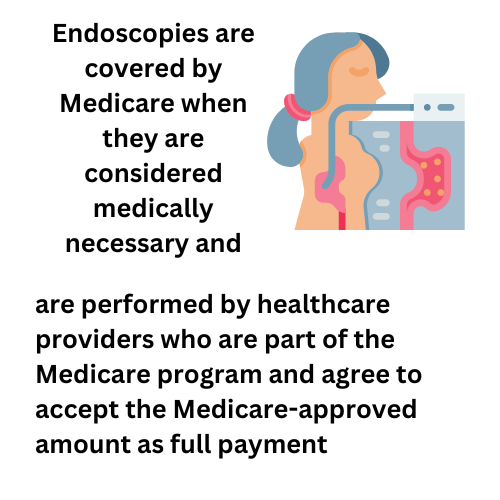Does Medicare Cover an Endoscopy Procedure?
Does Medicare cover an endoscopy? In short, yes – when it’s medically necessary and prescribed by your doctor. This coverage could be a relief for those facing the possibility of an endoscopy, a valuable tool in diagnosing and treating numerous health issues.
This article aims to provide a concise exploration of Medicare coverage for endoscopies, what your obligations might be, and how to navigate the insurance process seamlessly.
Key Takeaways
- Medicare might cover endoscopy procedures when they have been deemed medically necessary and performed by a Medicare-approved provider.
- Some of the Medicare Advantage plans may offer additional benefits and different cost structures for endoscopy, which might include potential preauthorization requirements, fixed copayments, and lower out-of-pocket costs compared to Original Medicare.
- Some of the potential out-of-pocket costs for Medicare beneficiaries undergoing an endoscopy might include a Part B deductible, up to 20% coinsurance, and other possible fees. Medigap and employer or union plans may provide supplemental coverage to help with these costs.
Compare Plans in One Step!
Enter Zip Code
Understanding Endoscopy and Medicare Coverage
Endoscopy will likely hold a pivotal place in medical diagnosis and treatment, providing non-invasive access to examine internal organs and tissues. From a diagnostic perspective, it’s often the first step toward understanding a wide range of health conditions. Medicare might step in to potentially shoulder a significant part of the associated costs. Medicare might provide coverage for endoscopy procedures when a physician deems them medically necessary.
This might include a range of endoscopic procedures like colonoscopies and gastroscopies. Familiarizing yourself with Medicare’s rules for covering these procedures could help you secure the right coverage and steer clear of unforeseen expenses.

The Role of Endoscopy in Medical Diagnosis
Endoscopy could be a powerful diagnostic tool that allows doctors to visually examine different anatomical structures, including:
- the throat
- esophagus
- stomach
- duodenum
- ears
- nose
- colon
- joints
This non-invasive procedure usually involves the use of a small camera and is a common example of outpatient medical treatment. It could offer a significant advantage over open surgery by allowing a thorough examination of internal organs and tissues.
In cases where a tissue mass is observed during an upper gastrointestinal endoscopy, a biopsy or tissue sample may be obtained for further examination to ascertain the nature of the condition. It may be vital that the procedure may be performed by a Medicare-approved doctor to guarantee coverage.
When Endoscopy Becomes a Treatment
In certain cases, endoscopy might go beyond diagnosis and could serve as a therapeutic tool. For instance, it may be used for the removal of polyps through procedures such as endoscopic mucosal resection (EMR) or endoscopic submucosal dissection (ESD).
These techniques could allow for the removal of large polyps without necessitating surgical resection, which could be a significant advancement in medical procedures.
Endoscopy may also be employed for:
- Obtaining biopsies in instances of gastrointestinal complaints
- Obtaining biopsies in cases of normal upper endoscopic findings
- Testing for diseases and conditions
Although this might seem overwhelming, bear in mind that endoscopy is safe when performed by skilled medical professionals. The potential risks, such as allergic reactions to the sedative, digestive tract bleeding, or infection, are usually minimal.
Decoding Medicare’s Coverage for Endoscopy

Endoscopies will likely be covered by Medicare when they are considered medically necessary and are performed by healthcare providers who are part of the Medicare program and agree to accept the Medicare-approved amount as full payment.
However, the cost structure of Medicare Advantage plans may vary considerably from that of Original Medicare. Certain Medicare Advantage plans may implement fixed copayments for outpatient services like endoscopies, potentially providing beneficiaries with more consistent expenses and potentially lower costs compared to Original Medicare.
Before scheduling an endoscopy procedure, be aware that you might need to secure approval from Medicare or your plan provider if you’re enrolled in a Medicare Advantage plan. This step, known as preauthorization, could be key in confirming the medical necessity of the procedure, managing potential costs, and minimizing the risk of claim rejections.
Original Medicare (Part B) and Endoscopy
Diving deeper into the specifics, Original Medicare (Part B) may cover endoscopy if it meets the criteria for an outpatient procedure or if the doctor or healthcare provider accepts Medicare. When Medicare covers the procedure and it is covered by Original Medicare, beneficiaries may be responsible for up to 20% of the Medicare-approved amount for the procedure, while Medicare will likely pay the remaining 80%.
However, the cost may vary depending on the facility utilized and the geographic location where the procedure is conducted. Original Medicare (Part B) uses the official Procedure Price Lookup tool to determine the Medicare-approved amount for an endoscopy, which could compare the national average costs with those specific to ambulatory surgical centers and hospital outpatient departments.
The Role of Medicare Advantage Plans
Medicare Advantage Plans, also known as “Part C” or “MA Plans,” are provided by private companies authorized by Medicare. They encompass all the services offered under Original Medicare, with some also providing extra coverage for:
- Prescription drugs
- Vision
- Hearing
- Dental
The customary copayments for endoscopy procedures within certain Medicare Advantage Plans may vary and will likely be contingent upon the type of facility utilized. What’s more, some plans may enhance the affordability of endoscopy by providing coverage for up to 80% of the cost once the annual Part B deductible has been satisfied.
Potential Out-of-Pocket Costs for Endoscopy Under Medicare
The potential out-of-pocket costs that could be associated with endoscopy under Medicare may encompass:
- a 20% coinsurance
- anesthesia fees
- expenses for any immediate treatments or interventions during the procedure
- separate charges for facility fees and physician services
This means that the total cost could be higher than expected.
Understanding Your Deductible
A deductible is the annual sum that an individual must pay for covered healthcare services before their Medicare plan begins to provide coverage. Once the deductible is met, the individual may only be responsible for a copayment or coinsurance, with Medicare covering the remaining costs.

Before Medicare begins to cover the cost of an endoscopy procedure, the Part B deductible must be paid out of pocket. Remember, the deductible amount for Medicare Part B will likely reset annually on January 1st.
Coinsurance and Copayments
Coinsurance and copayments may also be essentially your share of the cost of endoscopy, which could vary depending on your Medicare plan. Coinsurance will likely involve sharing costs based on a percentage of the total cost, while copayments may involve fixed, predetermined amounts.
In the Medicare system, once the annual deductible is met, Medicare may provide coverage for up to 80% of the approved cost for an endoscopy procedure. The remaining 20% coinsurance will likely be the individual’s responsibility, on the condition that the procedure may be carried out at a Medicare-approved facility by a Medicare-approved provider.
Selecting a Healthcare Provider for Your Endoscopy
Choosing a suitable healthcare provider could be a vital step in your endoscopy journey. This decision might not only guarantee that you receive top-notch care but could also significantly impact your out-of-pocket costs.
In-Network vs. Out-of-Network Providers
In-network providers are those who agree to accept your health insurance plan, whereas out-of-network providers are not contracted with your insurance provider.
Medicare might provide coverage for endoscopy services provided by out-of-network providers if the procedure has been considered medically necessary. However, the patient’s potential out-of-pocket costs may be higher when using an out-of-network provider in a hospital outpatient setting.
Preauthorization Requirements
Pre-authorization is a process where the insurance company assesses and grants approval for an endoscopic procedure before it is carried out, ensuring its medical necessity.
Securing pre-authorization could be paramount for endoscopy under Medicare Advantage plans since it will likely authenticate the medical necessity of the procedure, potentially averting unexpected out-of-pocket costs and assuring the procedure’s coverage by the plan.
Additional Insurance Options to Consider
In addition to Medicare, there may be other insurance options that you might want to consider when planning for an endoscopy procedure. These could include Medigap policies and employer or union plans, which could help cover certain costs that Medicare doesn’t.
Medigap and Endoscopy Costs
Medigap will likely serve as a supplementary insurance to complement Original Medicare coverage. In the case of an approved endoscopy procedure under Part B, Medicare will likely cover up to 80% of the care costs, and Medigap may also assist in covering the remaining out-of-pocket expenses, which might include deductibles and coinsurance. This is how Medicare pay could work in conjunction with Medigap.

This additional coverage, which some insurance plans may cover, could provide a safety net, ensuring that you may be well protected from unexpected costs.
Employer or Union Plans
Employer or union plans could also offer additional coverage for endoscopy procedures, potentially reducing out-of-pocket expenses. Some of these plans might encompass a range of providers and provide monetary advantages such as potential reductions on deductibles, copayments, and coinsurance for endoscopies.
Comparing Medicare Plans for Endoscopy Coverage
Finally, let’s discuss the significance of comparing Medicare plans to identify the most suitable endoscopy coverage. There will likely be various online tools that could assist in comparing Medicare Advantage plans for endoscopy coverage.
Factors to Consider When Comparing Plans
When looking to compare Medicare plans for endoscopy coverage, you might want to:
- Scrutinize the Evidence of Coverage (EOC) and Annual Notice of Change (ANOC)
- Evaluate the inclusion of prescription drug coverage
- Ascertain the options for doctors and hospitals.
Tools for Comparing Medicare Advantage Plans
Various online tools such as NerdWallet’s comparison tool, and Humana’s comparison tools could assist in comparing Medicare Advantage plans for endoscopy coverage. This may help you assess which plan could offer the greatest value and align with your particular healthcare requirements.
Summary
Understanding how Medicare could cover endoscopy may help you navigate some of the potential financial implications of this medical procedure.
By comparing Medicare plans, considering additional insurance options, and choosing the right healthcare provider, you could ensure that you’re well-prepared for the costs that might be associated with endoscopy. Remember, being informed about your Medicare coverage could help you make the best decisions for your health.
Frequently Asked Questions
→ Is a colonoscopy and endoscopy covered by Medicare?
Yes, Medicare Part B might cover both colonoscopy and endoscopy procedures. Medicare will likely cover screening colonoscopies at 100% once every 24 months for those at high risk for colorectal cancer, and there may be coverage for endoscopy if used to screen for disease.
→ Why is endoscopy not covered by insurance?
Endoscopy may not be covered by insurance because it is considered a diagnostic procedure, rather than a treatment. However, if something is found during the endoscopy that could require further treatment or surgery, insurance may cover it as part of pre-hospitalization expenses.
→ What medical procedures are not covered by Medicare?
Medicare might not cover routine dental exams, dental work, dentures, routine vision care, hearing care, weight loss medications, long-term care, most vision care, cosmetic surgery, eyeglasses or contact lenses, and certain other medical procedures.
This may include some elective and most cosmetic surgery, as well as some alternative forms of medical care such as acupuncture, acupressure, and homeopathy. Therefore, individuals might need to consider alternative coverage options for these services.
→ What is the significance of endoscopy in the realm of medical diagnosis and treatment?
Endoscopy could be crucial in diagnosing and treating various health conditions by allowing non-invasive examination of internal organs.

ZRN Health & Financial Services, LLC, a Texas limited liability company
Russell Noga is the CEO of ZRN Health & Financial Services, and head content editor of several Medicare insurance online publications. He has over 15 years of experience as a licensed Medicare insurance broker helping Medicare beneficiaries learn about Medicare, Medicare Advantage Plans, Medigap insurance, and Medicare Part D prescription drug plans.



